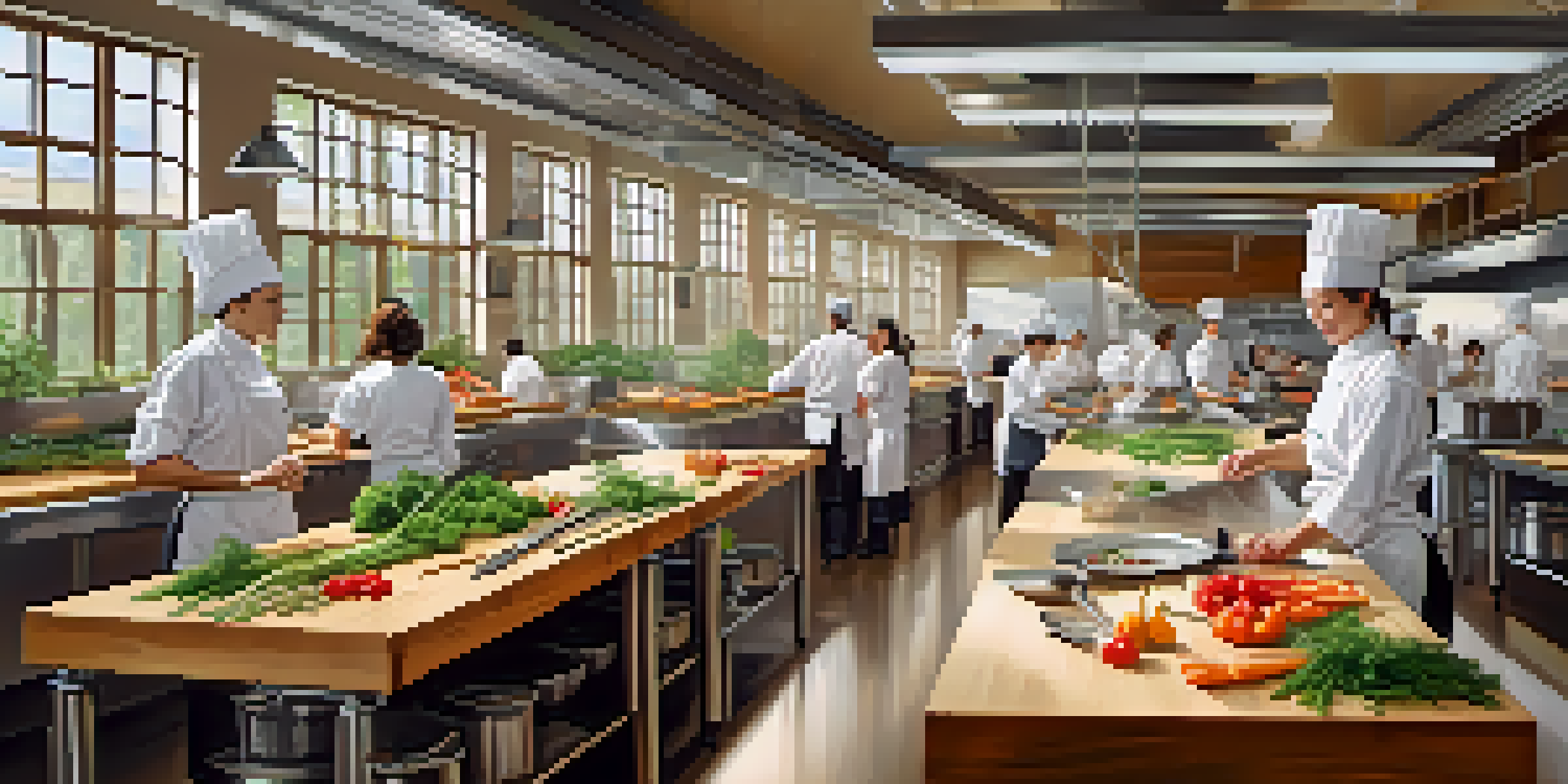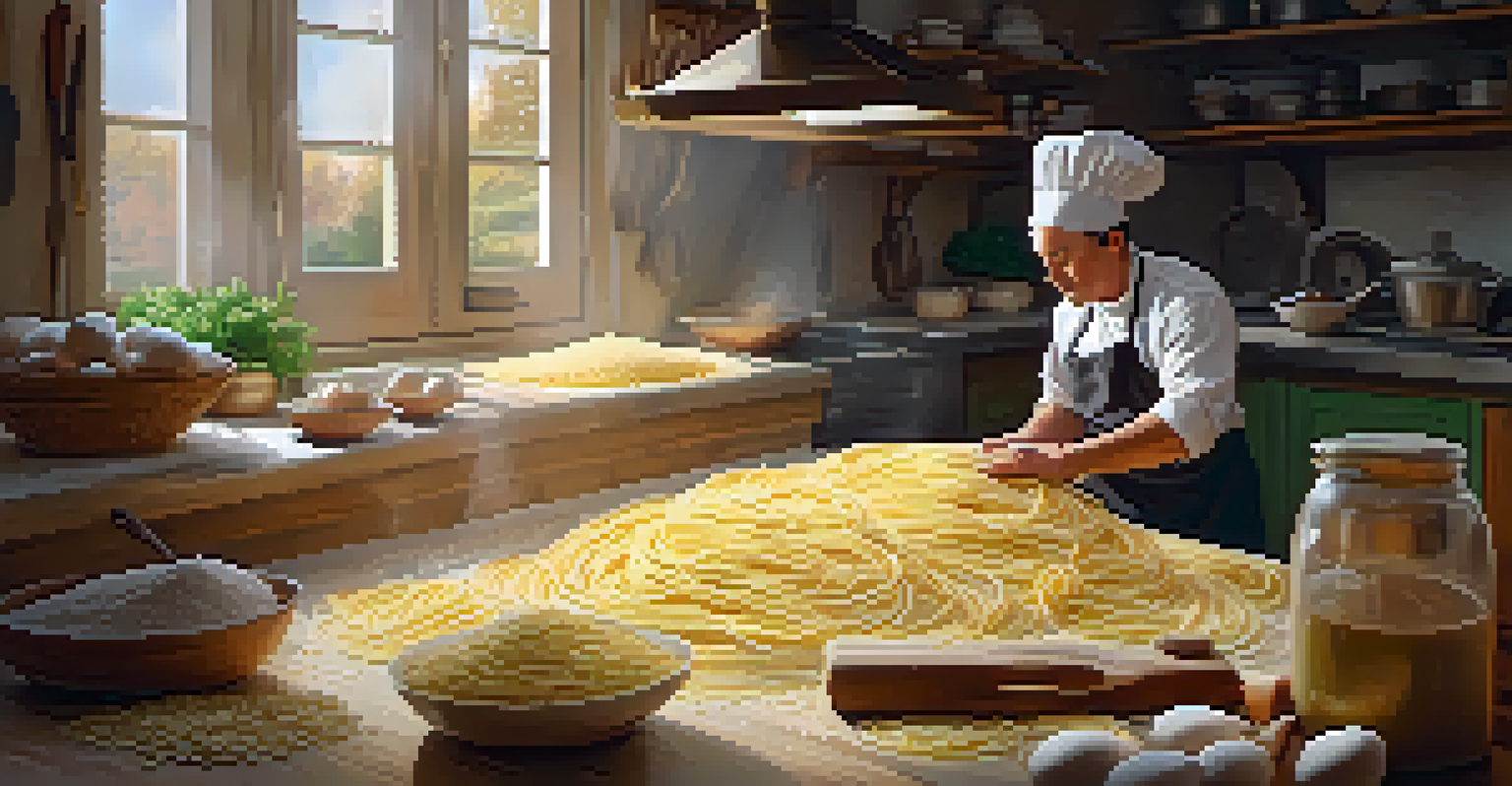Top Culinary Education Programs to Enhance Cooking Skills

Understanding the Importance of Culinary Education
Culinary education is more than just learning how to cook; it's about mastering the art of food. Understanding techniques, flavors, and presentation can elevate your dishes from ordinary to extraordinary. It also fosters creativity, allowing you to experiment and develop your unique style.
Cooking is like love. It should be entered into with abandon or not at all.
A structured culinary program provides foundational skills that are essential for any aspiring chef. You'll learn about nutrition, kitchen management, and food safety, which are crucial in a professional setting. This comprehensive approach ensures that you’re well-rounded and prepared for various culinary challenges.
Moreover, culinary education often opens doors to networking opportunities within the industry. Meeting fellow chefs and instructors can lead to mentorships or job placements, making it a valuable investment in your culinary career.
Le Cordon Bleu: A Global Culinary Institution
Le Cordon Bleu is one of the most prestigious culinary schools in the world, known for its rich history and tradition. Founded in Paris, it offers programs in cuisine, pastry, and hospitality management, attracting students from across the globe. Their curriculum blends practical skills with theoretical knowledge, ensuring a well-rounded education.

Students at Le Cordon Bleu benefit from hands-on experience in state-of-the-art kitchens, working alongside experienced chefs. This immersion helps students build confidence and refine their techniques in a real-world setting. Additionally, the school’s global network of alumni can be an asset for future job opportunities.
Culinary Education Enhances Skills
Culinary education equips aspiring chefs with essential techniques, flavors, and presentation skills to elevate their cooking.
With campuses in various countries, Le Cordon Bleu offers a unique chance to experience different culinary cultures. Whether it's mastering French cuisine or exploring international dishes, the school prepares students for diverse culinary landscapes.
The Culinary Institute of America: A Leader in Culinary Arts
The Culinary Institute of America (CIA) is widely recognized as a leader in culinary education. With campuses in New York and California, CIA offers associate and bachelor’s degrees in various culinary disciplines. The school emphasizes hands-on learning, allowing students to practice their skills in a professional kitchen environment.
The only real stumbling block is fear of failure. In cooking, you’ve got to have a what-the-hell attitude.
CIA's curriculum covers everything from culinary fundamentals to advanced techniques, ensuring that students are well-prepared for the industry. The school's focus on sustainability and farm-to-table practices reflects current trends in the culinary world, making graduates highly sought after.
Networking opportunities abound at CIA, where students can connect with industry professionals through events and externships. This exposure not only enhances learning but also paves the way for future employment in the competitive culinary field.
Apicius: A Unique Culinary Experience in Italy
Located in Florence, Apicius offers a unique culinary experience that combines cooking with Italian culture. This school is perfect for those who want to immerse themselves in the rich traditions of Italian cuisine. Students learn from experienced chefs while exploring the vibrant food scene of Italy.
Apicius offers a variety of programs, including short courses and full-degree options, catering to different culinary interests. From pasta-making to wine pairing, the courses are designed to enhance both practical skills and theoretical knowledge. This hands-on approach helps students appreciate the nuances of Italian cooking.
Networking Boosts Culinary Careers
Attending culinary schools provides valuable networking opportunities that can lead to mentorships and job placements in the industry.
Studying in Italy also provides students with a chance to connect with local food producers and artisans. These relationships can be invaluable for those looking to specialize in Italian cuisine or start their own culinary ventures.
Johnson & Wales University: Blending Culinary Arts with Business
Johnson & Wales University (JWU) stands out for its blend of culinary arts and business education. Their programs equip students with not only cooking skills but also essential knowledge in management and entrepreneurship. This combination is crucial for those looking to run their own restaurants or food businesses.
At JWU, students learn from industry professionals and gain hands-on experience in various culinary settings. The curriculum includes practical kitchen work, as well as courses in marketing and finance, ensuring that graduates are well-prepared for all aspects of the culinary industry.
JWU also emphasizes innovation, encouraging students to experiment and think creatively. This focus on developing a personal culinary style can set graduates apart in a competitive job market.
Culinary Arts Programs at Community Colleges
Many community colleges offer affordable and accessible culinary arts programs, making them a great option for aspiring chefs. These programs often provide foundational skills in a shorter time frame, allowing students to enter the workforce more quickly than traditional culinary schools. Plus, the smaller class sizes often result in more personalized instruction.
Community college culinary programs typically cover essential topics, including knife skills, cooking techniques, and food safety. Students can gain practical experience through internships and hands-on projects, which are crucial for building confidence in the kitchen. Many programs also offer certifications that can enhance employability.
Diverse Learning Options Available
From traditional schools to online programs, there are various culinary education paths to suit different learning styles and career goals.
Additionally, community colleges often have strong ties to local restaurants and food businesses, providing excellent networking opportunities. This connection can lead to job placements or mentorships, helping students launch their culinary careers.
Online Culinary Programs: Learning at Your Own Pace
In today's digital age, online culinary programs are becoming increasingly popular. They offer the flexibility to learn cooking techniques and culinary theory from the comfort of your home, making it easier for busy individuals to pursue their passion for cooking. These programs often include video tutorials and interactive assignments to enhance the learning experience.
While online programs may not provide the hands-on experience of traditional culinary schools, many offer options for virtual cooking classes or local workshops. This hybrid approach allows students to practice what they've learned and receive feedback from instructors, ensuring they develop essential skills.

Moreover, online culinary programs can cover a wide range of topics, from baking to international cuisines. This diversity allows students to tailor their education to their specific interests and goals, making learning both effective and enjoyable.